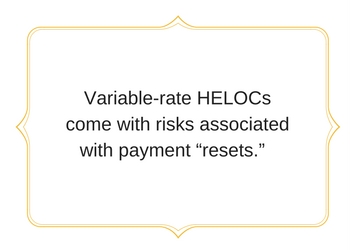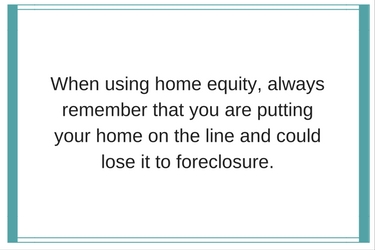 Although we reference and mention them throughout this home equity borrowing guide, it may be helpful to reiterate and expand on why borrowers should be cautious about using their home equity.
Although we reference and mention them throughout this home equity borrowing guide, it may be helpful to reiterate and expand on why borrowers should be cautious about using their home equity.
- Borrowing your home equity means taking on new debt, and debt must be repaid
- Home equity is not a direct substitute for actual cash savings
- Access to your home equity is at the behest of the lender, and could be curtailed at times when it is most needed
- Drawing all of the equity out of a home increases the chance that the borrower might owe more than the home is worth if home values decline
- HELOCs are variable rate instruments, and a rising interest rate environment could make it difficult to make payments
HELOC payment "resets"
In addition to the above list, variable-rate HELOCs come with risks associated with payment "resets." HELOCs are often structured not only with advance and repayment terms, but a common feature is that during the advance period, required payments may be comprised of interest only (or interest plus such a small amount of principal as to not pay down the balance by a meaningful amount).
 At the end of the HELOC advance period, access to new borrowing is terminated, and any outstanding balance must be retired over time. However, in order to do so in a way that will pay it off at or before the total repayment term (usually 10 to 20 years), the composition of each payment is changed, and typically now includes not only interest, but also a sizable bit of principal.
At the end of the HELOC advance period, access to new borrowing is terminated, and any outstanding balance must be retired over time. However, in order to do so in a way that will pay it off at or before the total repayment term (usually 10 to 20 years), the composition of each payment is changed, and typically now includes not only interest, but also a sizable bit of principal.
"Payment resets" bedeviled more than a few homeowners who took out home equity lines of credit during the home equity borrowing boom in the early 2000s. With the mortgage crisis fresh on their minds and sizable blocks of homeowners facing payment resets in the 2013-2018 years, regulators produced studies and sent warnings that considerable increases in payments were coming to home equity line holders, with increases reckoned to be hundreds of dollars per month per borrower.
Encouraged by loan modifications and other efforts to manage mortgage payment problems, regulators began encouraging lenders and borrowers to work together to head off any issues before they festered and borrowers began to miss payments. Although the problem never reached crisis proportions (thanks to a mild interest rate environment and various forms of refinancing and term modifications) there is no certainty that this sort of widespread cooperation will be the case in the future.
A rising interest rate environment would tend to make a payment reset issue far worse, and while a lender may be acting in self-interest to protect his portfolio when a vast number of loans/lines could go south at once, they may not be so willing to work out solutions in the future if your one single HELOC entry on the books should become troublesome.
 Estimate HELOC payment reset implications
Estimate HELOC payment reset implications
If you are considering taking a HELOC, know the terms. Understand the period(s) when payments are interest-only, and ask the lender to calculate how much your payment may increase under a few scenarios, such as:
- A small balance but a big rate increase
- A large balance with moderately higher rates
- A maxed-out balance and an interest rate that is high (probably 8 percent to 10 percent or more).
Be sure to calculate these numbers for both the interest-only (or minimum payment) advance period and for the period where the payment resets to fully amortizing. In this way, you'll know the risks beforehand, even if that doesn't make them any easier to manage later. Of course, when using home equity, always remember that you are putting your home on the line and could lose it to foreclosure.
As with any financial instrument, it can pay to shop around for the best possible terms and rates. That's even more the case for a product that has little standardization and where lenders may or may not price to entice borrowers or wish to be fully active in the market.
As we noted above, having a home equity line of credit isn't the same as having actual cash savings. Unlike your own cash, access to a home equity line of credit can be curtailed or even terminated if market conditions or your own finances turn south, so there's another risk to consider: the risk that your ability to tap your home equity may not be there when you need it most.
The final section in HSH.com's guide to home equity borrowing provides suggestions on how to research the market so you can find the best deal for your needs.
Next article: Questions to ask your home equity loan or line lender
Previous article: Home equity borrowing fees



